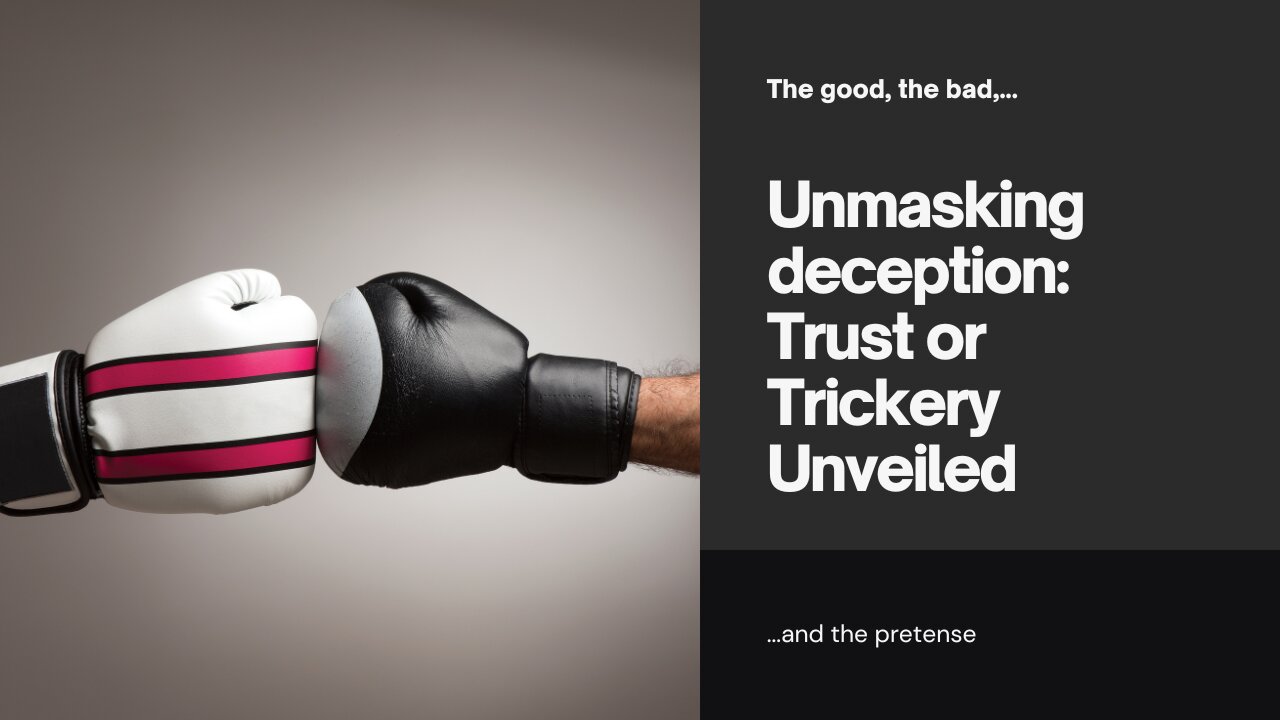Premium Only Content

The good, the bad, and the pretense
The good, the bad, and the pretense
By Terry A. Hurlbut
Bad actors will always try to look good, until (and if ever) their evil becomes undeniable, but good people can never disguise themselves.
Angels are bright still, though the brightest fell.
Though all things foul would wear the look of grace,
Yet grace must still look so.
MacBeth IV.iii.22-24
William Shakespeare wrote those lines to illustrate the central problem of good and evil. The riddle, for the just, is twofold. First, how can they trust anyone, given that bad actors will always hide their evil intent? Those whom they should trust, cannot distinguish themselves from those whom one should not trust. Second, the just may not use unjust methods, or they, too, will provoke suspicion in others. Such is the riddle that now confronts Americans of good will. The near-assassination of Donald J. Trump demands investigation – but what agency of competent authority can the people trust? At the same time – assuming Trump becomes President again – he might have trouble creating or empowering a trustworthy agency himself.
The trust issue between good and evil
Shakespeare, in writing those lines about angels, sought to illustrate the trust issue. The character who speaks them (Malcolm, Prince of Cumberland) has had to flee his country (Scotland). MacBeth, a general officer whom Malcolm’s father (King Duncan) trusted, assassinated the King to have his throne. Now comes MacDuff, a nobleman seeking to encourage Malcolm to recruit an army and regain his throne in the only way possible: through open warfare. The audience knows that Malcolm should trust MacDuff, but can Malcolm know that?
Malcolm solves his riddle, ironically, by abandoning his “good” image. He cultivates the image of a grasping, lustful, avaricious, and power-hungry prince – and before that image, MacDuff recoils in horror. Only then does Malcolm know he can trust MacDuff – because MacDuff comes to the point of making no further allowances. Of course, Malcolm must reassure MacDuff that he was only testing him – a difficult task, and Shakespeare so portrays it. But he succeeds, and Malcolm agrees to seek an alliance with the English king (Edward the Confessor) and take command of an army of Scottish loyalists, to combine with an English force (Siward, Earl of Northumberland, commanding) which King Edward sends to join Malcolm.
Whom can Americans believe today?
That trust issue looms large today, in the aftermath of that near-assassination. The Secret Service is charged with Trump’s safety (and that of President Biden, his family, and most other Presidential candidates). And it failed its mission with breathtaking incompetence and incomprehensible decisions. As CNAV has said: incompetency alone could explain why Thomas Matthew Crooks could lurk on a slightly sloping rooftop, 150 yards from his target, for nearly half an hour before H-Hour. Similarly, psycho-social problems could have provided sufficient motive for Crooks to attempt what he attempted. Almost. Some of those decisions suggest worse than incompetence: an actual desire that someone rid the Earth of an adversary who has declared his intent to avenge himself upon a host of governing officials from the White House down.
For more than a year, supporters of the once and (likely) future President have suggested that precise motive. Why, for instance, did the Secret Service deliberately shift assets from Trump’s security detail to that of the First Lady? Reporter Susan Crabtree of the Real Clear Foundation alleges that precise thing:
https://x.com/susancrabtree/status/1812606597753168329
The denials by the Secret Service ring hollow – and Susan Crabtree is not buying them. Interestingly, she made allowance for Anthony Guglielmi, the Service’ spokesman, for not having been informed.
https://x.com/susancrabtree/status/1812691744636403773
But does this, as Crabtree suggests, reflect an inflexibility at the Secret Service? Did they really not realize that Trump was no ordinary candidate, but was trying to become another Grover Cleveland?
Incompetence? Boneheaded decision making? Or worse?
Why won’t he answer?
Add to it that Guglielmi not only never answered Crabtree’s questions, but hasn’t said a word on X since leaving a bland, boilerplate statement,
https://x.com/SecretService/status/1813073999251054676
and then embedding video of the worst interview a law-enforcement agency director eve r gave.
https://x.com/SecretSvcSpox/status/1813080492583055598
The response he got clearly illustrates the open public skepticism of anything the Secret Service has to say for itself.
https://x.com/vanawesome/status/1813407252977697177
In short, we are all Malcolm, Prince of Cumberland, now. Nor do we limit our skepticism to the Secret Service. The FBI has now entered the case, as the agency in charge of the investigation. But this same FBI raided Donald Trump’s home with orders to use deadly force, if necessary. Furthermore, they answer to an Attorney General who illegally appointed a special prosecutor to hound Trump and his close associates.
Dr. Steve Turley confirmed to his Insiders on Monday evening that no investigation worthy of the name, will happen before January 20, 2025. By then, not only will the trail be cold, but the “investigators” will likely destroy evidence. If any hard evidence now exists of collusion with an organizational suspect that placed a patsy on that rooftop, they will destroy it. And today, they don’t need a Jack Ruby to dispose of this modern Lee Harvey Oswald.
Good people must use good methods
We now turn to the second issue that Shakespeare highlighted: that good people must use good methods. Two days ago, Judge Aileen Cannon of the U.S. District Court for the Southern District of Florida (Miami Division), in a ninety-three-page tour de force worthy of the Supreme Court itself, showed – incontrovertibly – that Attorney General Merrick Garland made an illegal, even unconstitutional, appointment. True, that opinion might not “hold.” for we don’t know what the Eleventh Circuit Court of Appeals will do. But as good people, we cannot ignore it. We must abide by the law and Constitution, even as evil people do not.
So Donald Trump could not lawfully name, say, Dan Bongino as “Internal Security Czar” or some such thing. CNAV is sure Judge Cannon – and Justice Clarence Thomas – might argue that not one of so many “Czars” is legal. Not, that is, unless:
1. Congress, not the White House, creates the position, and
2. Trump nominates someone to that position and sends him to the United States Senate.
True, the Heritage Foundation now suggests that Republicans will “flip” the Senate and retain the House. But suppose they don’t? Well, then, Trump would have to content himself with recalling Bongino from retirement and appointing him to direct the Secret Service. He then could run an “internal affairs” type investigation – a crude method, but the only one Trump could justify. Presidents propose, and Congress disposes.
Do evil people ever declare themselves?
Incredibly, sometimes they do. For instance, YouTube influencer Destiny, after the assassination attempt, used very ungentlemanly language to speak, not only of Trump, but also of Corey Comperatore, the retired fire chief who became the event’s only fatality on July 13, 2024. He then appeared on Piers Morgan’s “Uncensored” program to explain himself. Explain himself he did – utterly without remorse. Morgan, shocked, ranted and raved at the man – who smirked and stood by the despicable things he said.
https://www.youtube.com/watch?v=gt_CipOPPs0
Ironically, one can trust “Destiny,” because he tells you up-front that he hates you. (But only so far! He plays fast and loose with fact in his haste to condemn those with whom he disagrees.) To that extent, one can also trust people like George Stephanopoulos, Martha Raddatz, David Frum, Mehdi Hasan, Black Lives Matter 860 of Hartford, Conn., and a few not-quite-celebrities, who shall remain nameless, whose public reaction one can summarize in two words: Aw and Missed!
But of course President Joe Biden will “condemn” the attack as a “sick” act that has “no place” in America. He, who contributed to a provocative media climate for the attack, now condemns it. But notice: he won’t apologize for what he said, nor suggest that anyone else on his side apologize, either.
Summary
So, like Malcolm Prince of Cumberland, we come back to the same questions. Whom can we trust, and how can we know we can trust them? This goes beyond “gaslighting” of those who suspect, not mere incompetence, but collusion in an assassination attempt. It also goes beyond bad-faith criticism of the kind that so shocked Piers Morgan on his program. It goes to the actual collusion, and the treachery of which it is a part.
But Shakespeare also suggests a method to determine whom to trust. Seek not only whom the crime would profit, but whom the crime would destroy, if it went off as planned. Seek, in addition, those who stand to benefit directly when good people win. (As Robert J. Ringer advised in Winning Through Intimidation and Looking Out for Number One.) Finally, seek those who will take no shortcuts to conducting the investigation that must come, lawfully and Constitutionally. Seek also the Aileen Cannons and Clarence Thomases who are good enough to show the way.
Link to:
The article:
https://cnav.news/2024/07/17/news/good-bad-pretense/
Susan Crabtree’s posts:
https://x.com/susancrabtree/status/1812606597753168329
https://x.com/susancrabtree/status/1812691744636403773
Secret Service posts and response:
https://x.com/SecretService/status/1813073999251054676
https://x.com/SecretSvcSpox/status/1813080492583055598
https://x.com/vanawesome/status/1813407252977697177
Video: Piers Morgan Uncensored:
https://www.youtube.com/watch?v=gt_CipOPPs0
Declarations of Truth X feed:
https://x.com/DecTruth
Declarations of Truth Locals Community:
https://declarationsoftruth.locals.com/
Conservative News and Views:
https://cnav.news/
Clixnet Media
https://clixnet.com/
-
 20:10
20:10
Declarations of Truth
12 days ago2025 – on offense
1461 -
 1:24:23
1:24:23
Kyle Rittenhouse Presents: Tactically Inappropriate
12 hours ago $2.10 earnedThe Lawman
16.7K2 -
 10:36
10:36
Clownfish TV
11 hours agoMSNBC and Rachel Maddow NEED Trump to Stay in Business...
26.4K3 -
 4:10
4:10
PerpetualHealthCo
18 hours agoFDA Bans Red Dye No.3
10.1K1 -
 59:57
59:57
Trumpet Daily
21 hours ago $4.39 earnedRemembering Herbert W. Armstrong - Trumpet Daily | Jan. 16, 2025
15.1K13 -
 26:07
26:07
The Lou Holtz Show
14 hours agoThe Lou Holtz Show S 2 Ep 1 | Tony Rice on Championship Leadership and Notre Dame Legacy #podcast
29.1K2 -
 53:37
53:37
Weberz Way
15 hours agoGOODBYE JOE, TRUMPS CABINET, LA FIRES, & KEEP TIKTOK
16.4K -
 3:07:17
3:07:17
Alex Zedra
11 hours agoLIVE! New Game | Exorcism!??
41.7K4 -
 6:00:06
6:00:06
SpartakusLIVE
15 hours agoThe Conqueror of Corona || Delta Force LATER
91.7K3 -
 2:17:30
2:17:30
barstoolsports
17 hours ago$250k Winner Revealed With Final Votes And Reunion | Surviving Barstool S4 Finale
141K9